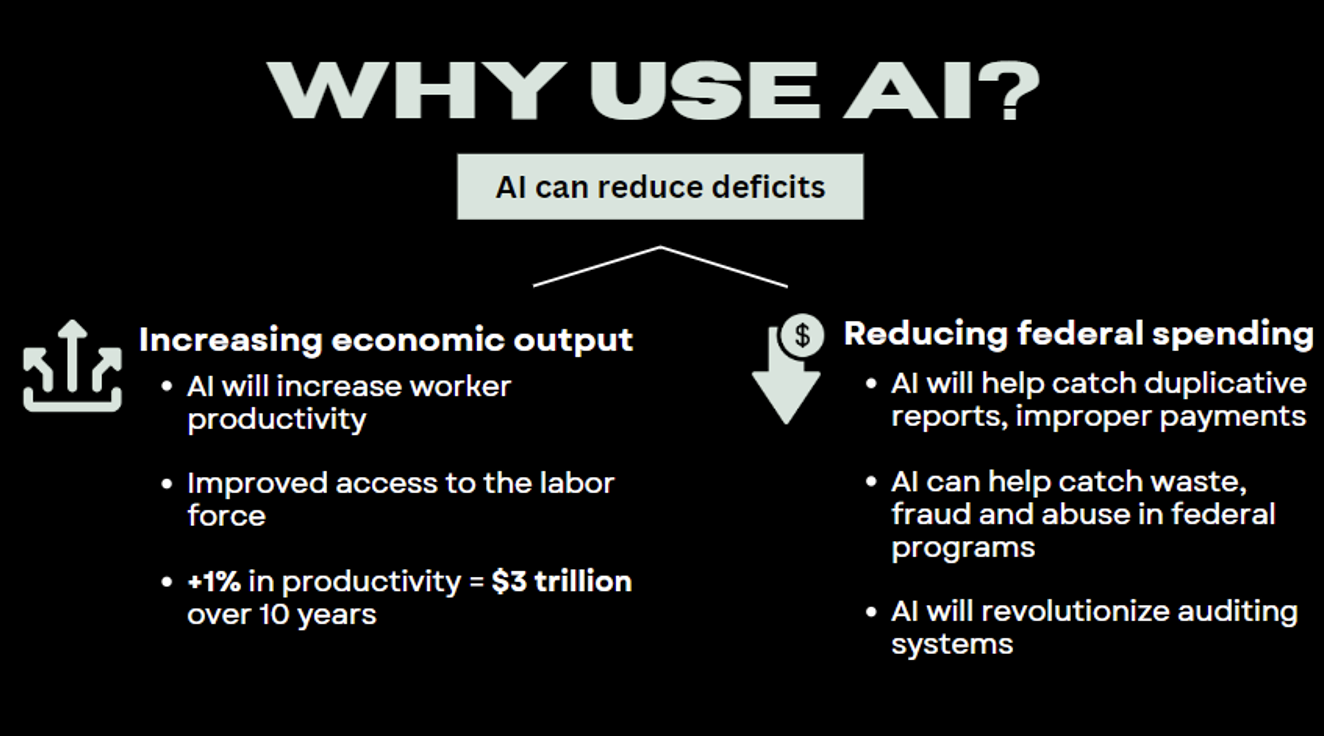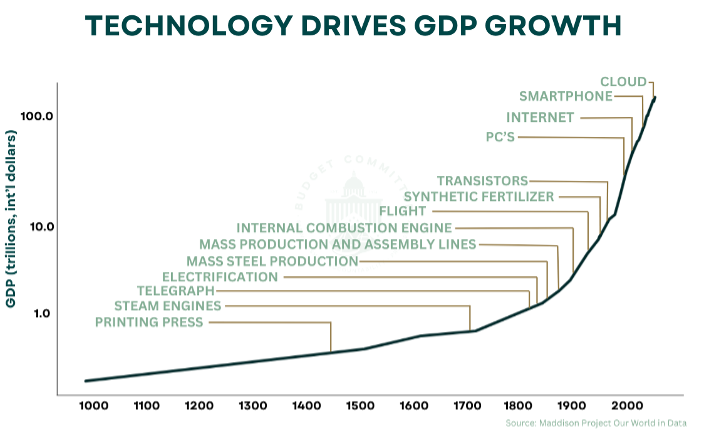House Budget Committee Holds Roundtable to Assess Implications of AI for the U.S. Economy and the Government
WASHINGTON, D.C. – Today, House Budget Committee members held a roundtable titled “The Age of Artificial Intelligence: Implications for the U.S. Economy and Government.”
The Committee welcomed Andrew McAfee, a principal research scientist at the MIT Sloan School of Management, and Jason Payne, Chief Technology Officer for Microsoft Federal, to speak to members of the committee about the impacts of artificial intelligence (AI) on the U.S. economy and its potential uses to improve government efficiency.
Chairman Arrington Statement on Today's Roundtable:
"Artificial Intelligence has the potential to revolutionize how the federal government spends and saves American taxpayer dollars and to help our economy grow faster. The House Budget Committee is leading the charge in assessing any and all technological innovations that can help us reduce the deficit and right our fiscal ship.
I would like to thank Andrew McAfee from the Massachusetts Institute of Technology (MIT) and Jason Payne from Microsoft Federal for speaking with our members about leveraging the untapped potential of AI to root out waste, rein-in the federal bureaucracy, and reignite economic growth. Our fiscal trajectory is unsustainable, but this tool can help. Our path forward hinges on two key solutions: reducing federal spending and growing our economy. Today, the House Budget Committee took a meaningful step toward understanding how AI can achieve these goals."
Artificial Intelligence Task Force Chair Rep. Obernolte on AI:
“With the federal budget deficit exceeding $1.9 trillion this fiscal year, $400 billion more than previously expected, the work of the House Budget Committee is critically important. Utilizing artificial intelligence to analyze and identify unnecessary and wasteful spending will streamline government operations and reduce the deficit. As a former member of the Budget Committee, I am confident the work that Chairman Arrington and the members of the House Budget Committee are undertaking will help the U.S. government capture the potential benefits that AI promises. The Administration’s misguided policies are continuing to grow the size of our national debt, and we must use all the tools available to shrink the size of the government, make it more efficient, and rein in the ballooning budget deficit.”
Background:

Photo: Members of the House Budget Committee held a roundtable titled “The Age of Artificial Intelligence: Implications for the U.S. Economy and Government.” Credit: House Budget Committee

Photo: Jason Payne, Chief Technology Officer for Microsoft Federal, and Andrew McAfee, a principal research scientist at the MIT Sloan School of Management speak to members of the committee about the impacts of artificial intelligence (AI) on the U.S. economy and its potential uses to improve government efficiency. Credit: House Budget Committee
AI is technology that seeks to create machines capable of performing tasks that simulate, or typically require human intelligence. The future of AI holds many opportunities as well as unknown challenges, which today’s roundtable helped members of the Committee understand.

AI has the potential to revolutionize how the Federal Government spends and saves taxpayer dollars and help the economy grow faster. Our fiscal trajectory is unsustainable, but this tool can help, if used properly. The path forward hinges on two key solutions: reducing federal spending and growing our economy.

AI could also be used within the Federal Government to revolutionize audits, catch improper payments, streamline entitlements, and bolster national security. The technology is currently being used in more than 700 instances in the Federal Government and more than 800 active AI projects in the Department of Defense. Some examples include:
- The Department of Energy: 179 total projects leverage AI. Some projects are testing sensing technology, big data analytics, and the collection of open-source data on potential threats to the energy sector.
- The Department of Homeland Security: 41 total projects leverage AI. These AI projects help agents and officers to flag high risk travelers, identify terrorist threats, and better protect our nation.
- The Department of Health and Human Services: 157 total projects leverage AI. Some of which include AI algorithms for ultrasound detection of lung injury, infectious disease, burn depth/size, fractures, and soft tissue damage.
- The Department of the Treasury: 14 total projects leverage AI. These include the deployment of machine learning to provide tax gap estimates based on tax statistics and improper payment reporting.
As AI becomes more widely adopted, it is essential that Congress is educated on the impacts this technology can have on our economy.
Today, the House Budget Committee took a step toward leadership in assessing any and all technological innovations that can help reduce the deficit and right our fiscal ship.
More from the House Budget Committee on AI:
Read more about the House Budget Committee and Artificial Intelligence HERE.


